Every legend has to begin somewhere. As you stand today and admire a Porsche 911, a Boxster, a Cayman, or any of the racing cars that have helped to cement the Porsche name into the record books as a legendary manufacturer, it is incredible to think that their lineage can be traced back to this 1939 Porsche Type 64. It was this car that bridged to the gap between the humble KdF-Wagen, and the Porsches that we have watched develop into the cars of today. Dr. Porsche and his son built three of these cars, and the third of these is now set to go to auction. Located in Monterey, California, it is listed for sale here at RM Sotheby’s. The auction in which this significant piece of motoring history is set to sell will be held from August 15th- 17th. However, if you want to become the next proud owner, you will definitely require a healthy bank balance. Pre-auction estimates suggest that the car will sell for somewhere in excess of $20 million.
Under the skin, the Type 64 was based upon the humble, Porsche-designed, KdF-Wagen. Following the end of World War II, this was the car that would eventually be known as the Volkswagen Beetle. Although based on the Beetle, the chassis is different in many ways, with Porsche utilizing a significant amount of aircraft technology in the design of the car in a bid to produce a car that was both light and strong. Attached to this chassis was a full complement of VW mechanical components, including the engine, transmission, and suspension. Stretched over the lightweight chassis was a handmade, and wind-tunnel developed, all-aluminum body. With only very limited engine power at his disposal, Dr. Porsche set out to build a car that was as aerodynamically efficient as possible, and this explains not only the smooth lines of the vehicle but features such as the alloy covers that enclose the wheel arches. The intent was to build a car that would compete in a race from Berlin to Rome, which was planned for September of 1939, Unfortunately, a small problem that is often referred to as World War II scuppered these plans, and Porsche Type 64 #1 became the property of the German Labor Front.
Dr. Porsche’s son, Ferry, did not abandon the idea and concept of the Type 64 and set to work constructing cars #2 and #3. Car #2 was constructed as a completely new car from the ground up but was identical to the original car. Sadly, car #2 was destroyed during the War. However, some of its original components were discovered in 1995, and it was rebuilt. Given the fact that many of the parts, including the distinctive body-shell, had to be reproduced, it is debatable whether #2 would be classed as original. Regardless of this fact, you can see the rebuilt #2, which is now housed at the PROTOTYP Auto Museum in Hamburg, in this YouTube video. Chassis #3, which is our feature car, was a slightly different matter. When the German Government took possession of the first car, it was used as transport by the then Managing Director of Volkswagen, who promptly crashed it. Porsche managed to take possession of the remains, and it was from these that car #3 was constructed. It was used as personal transport by the Porsche family and was restored in 1947. The car next saw the light of day when it was shown alongside the first 356 in 1948. The Type 64 was then sold to renowned Austrian racing driver Otto Mathé, who used it in active competition during the 1950s. He retained ongoing ownership of the car until his death in 1995. The Porsche was then purchased from the estate by its current owner, and returned to limited duties in displays and shows, including the Goodwood Festival of Speed. It is now set to head to its next owner at auction.
As the Type 64 was a low-powered car designed with competition in mind, the interior of the car could best be described as spartan. Luxury items were non-existent, and that is the way that the car has remained to this day. When the car’s racing history is considered, the interior has held together well. It isn’t perfect, but with a car of this heritage, the new owner will undoubtedly leave it untouched and original. One interesting aspect of the interior is the fact that in spite of this being a competition vehicle, instruments and gauges are in very short supply. You get a speedometer, and that’s it.
When you look at what occupies the engine bay of the Type 64, you really do begin to understand why Dr. Porsche devoted so much time and effort into minimizing weight and maximizing aerodynamic efficiency. The air-cooled flat-four engine in the Type 64 has a capacity of 985cc. In standard form, this was an engine that produced a mere 25hp. Careful tuning work and the inclusion of twin carburetors saw this output rise to 32hp. That isn’t a lot of power at the driver’s disposal, no matter how you look at it. However, the Type 64 was no slow-coach and could reach a top speed in excess of 100mph. This set the die for the Porsches to follow, as while their models have never been renowned for producing the highest power output figures in the sports car and supercar world, it is how these cars utilize their power that has made them true giant-killers.
Of all of the cars that I have written about here at Barn Finds, this has to be the most historically significant. Without this particular car, it is doubtful whether we would have seen the development of cars like the 356 and the 911. The fact that the Porsche family could develop and build such a car under the tyranny that was Nazi Germany, and in the face of the barriers that World War II must have placed before them, is a testament to the determination and resilience of Ferdinand and Ferry Porsche. This was the car that cemented the concept of the rear-engined, rear-wheel-drive sports car into the minds of these men, and convinced them to move forward with the development of the 356. I hope that the next owner doesn’t choose to hide the car away. I hope that he allows people to see it, and to appreciate just how far one of the World’s most iconic sports car brands has come since those humble and war-torn days.
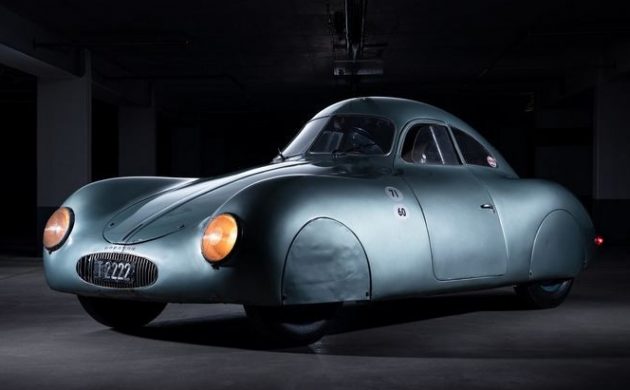
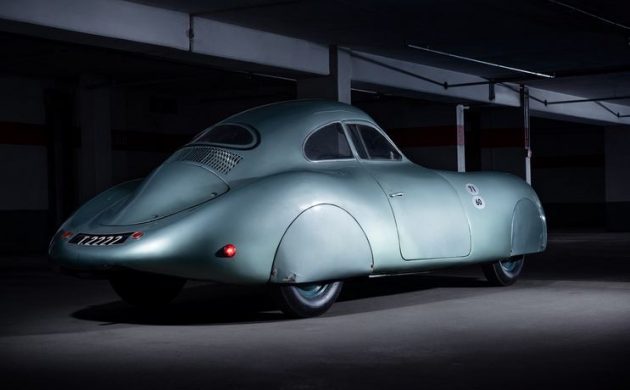
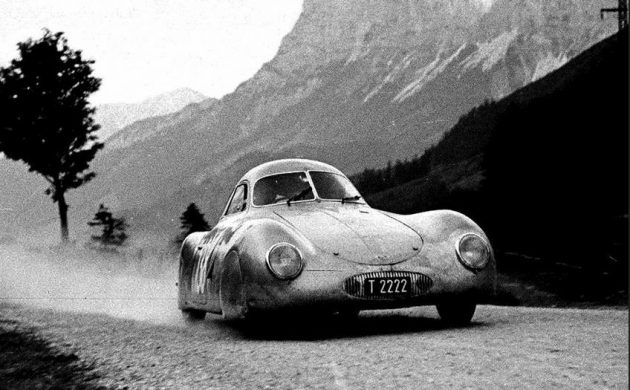
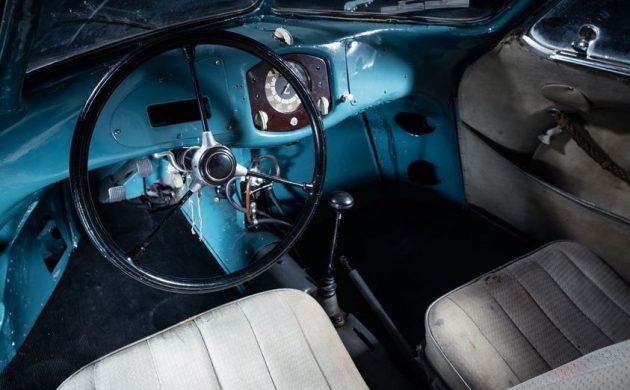
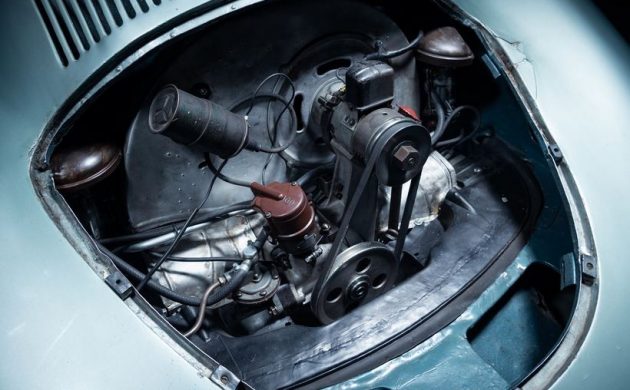
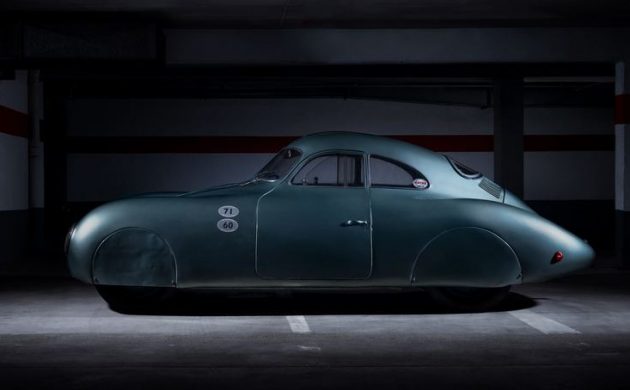
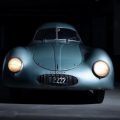
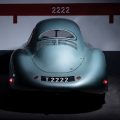
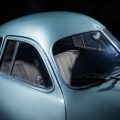
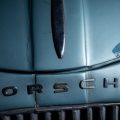
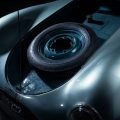
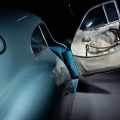
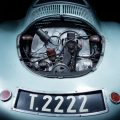
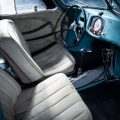
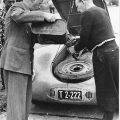
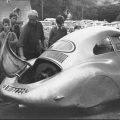
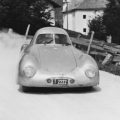





Amazing write-up, Adam!
Can I get it in red?
Struggling car museums are discussing selling a few other cars to acquire this one as we speak. Well heeled museums are stuffing a briefcase full of cash. Private collectors are salivating.
Jerry Burns used this same logic on my beloved Vikings in the H
Walker trade. Lol
Belt looks a little loose. Only $36,523 bucks to fix-
I don’t think its that amazing that they developed these cars as Hitler was himself possibly penned the original beetle.The peoples car.Hitler also wanted the world to see that the germans were the best at designing racing carswhich it would seem they were,and some might say still are.Dont get me wrong Ive driven and owned English cars all my life,original minis ,mgs and other various austens,my first car was an austen 1800.
It’s an Austin Dave.
Goodness, this has to be one of – if not THE most significant cars ever to come to market. I’m speechless…
wuzjeepnowsaab
It’s also bloody ugly !!
B.J. in 1939 this design probably set the whole automotive world on its collective ear. Ugly? By today’s standards maybe but 80 years ago it would have looked like Buck Rogers just flew it in and landed it in Germany
Porsche has built an empire on cars that bear a strong resemblance to a garden slug. Ugly ? I guess it all depends on who is looking at it. The 30’s streamlined look isn’t something I particularly like, but the smoothed-edges, all-rounded look was all the rage in the 1930’s and has been again these past 20 years. This car is pretty neat for what it is. This coming from a guy who generally refers to Porsches as “douche canoes”. Considering the Chrysler Airflow program (including Imperial and DeSoto) or the Tatra, and others, this car was a very special car, even amongst cutting edge design of form following function. I would love to give this a 10 minute drive, just to know what it feels like to drive such a car.
The staff here @ Barn Finds are remarkable, and the transportation knowledge of many of the readers is astounding as well. This forum is far better reading than some of the established magazines as is illustrated by this article. The span of diverse subject matter is fascinating and makes for truly interesting reading with all the feedback. The different approach to what is essentially the same subject matter is telling of the individual writer as well; Jamie showed his web prowess by his article and follow up regarding the Buick in Nevada City, for instance, leading some readers to pitching in with their own research (the scratch-made helicopter remake, for instance). Scotty’s articles about the boat and especially the Baldwin Locomotive, Jeff, Jay and Todd all lending an experienced critical eye when something some too good to b true or explaining why something is a great bargain.. (I’m new to this forum so please forgive me if I forgot anyone). Your regular readers too like Howard A., geomechs, Wayne, Miguel and all the many others who contribute show an amazingly vast array of mechanical knowledge as well as one of the more important learning tools, history.
Back in the day of STOCK car racing an interview with a winning crew chief talking about their ideas and solutions said it best: “there’s not one of us that’s smarter than all of us”.
Thank you all for making this a great forum every day.
And kudos to Jesse and Josh for ramrodding the whole thing!
Thanks for the kind words Nevadahalfrack! We couldn’t do it without our great team. They each bring so much knowledge and I feel grateful to know them all.
Best have small feet.
Time to brush up on German history, people. Ferdinand Porsche, like many other prominent germans, were courted, and often part and parcel of the Nazi regime. Many photos exist of Ferd and Adolph and/or other ranking Nazi party bigwigs looking over Ferd’s projects.
Post-war social forces largely try to focus our attention on welding the Nazis to the Holocaust, steering attention away from the fact that they had their fingers into EVERYTHING as a matter of social engineering. It is hard to discuss the Nazi topic today, as most consider it so toxic, but not everything that happened in Germany between 1933 and 1945 was bad. To try and distance Ferdinand Porsche from the Nazi machine is to perform revisionist history.
http://www.porscheprototype.com/adolf-hitlers-manager-ferdinand-porsche.html
No, Porsche used slave labor in the factories during the war. It is unforgivable. The company should have been disbanded, though that wasn’t the American way, was it? We welcomed many war criminals into our land with open arms. The bad karma we now have has its roots in many places, this being one of them.
Hitler did not pen the Beetle. He financed it. Dr. Porsche was responsible for designing most of Germany’s superior armor. Including the much feared Tiger 1 tank.
The way I understand it, Dr Porsche was ordered to design the VW that we all know. He was quietly doing his own thing trying to perfect a radial engine for automotive use when his work was interrupted by Hitler.
Still just a glorified vw. This car does nothing for me.
michael h streuly did state, “Still just a glorified vw. This car does nothing for me”
How about the projected $20 million-dollar-plus hammer price? :-) :-)
You have my deepest sympathy.
Nice, but I would still prefer the 250 GTO that was just sold.
Amazing write up and great comments also. I’m speechless, it’s almost like looking at pictures of an actual, documented UFO.
Who wants to bet either Jay Leno or Jerry Seinfeld ends up with this car?
Nah, my bet is on Bob Ingram. After the insurance check he is getting for his damaged cars, I think he is going to want to rebuild his collection
$20 million can buy a lot of cars & motorcycles & trucks & whatnot.
Heck, I could buy about 200 chopped & slammed & channelled 49 Mercs with that amount of cash.
Bob
Didn’t they lift the concept from The Czeck Tatra?
Where is car #1 ???
From Randy Leffingwell’s “Porsche, A History of Excellence”, “In mid-1949 Austrian racer Otto Mathe purchased this Type 60K 10 from Porsche and registered it in his home district of Tyrol………..He had lost his right arm in a motorcycle accident before the war, so he had mechanics convert the car to right-hand drive so he could steer and shift with his left arm” The last two black and white photos show it as a right-hand drive. When and who changed it back? It was given the type number 60K10 (the 60 representing the standard VW project number, the K10 indicating that this was the 10th special body)
Car No. 3 (this car) was constructed out of car No. 1 rescued parts as far as I can make out from the excellent write up. As car no. 2 is constructed from a lot of non original parts so might be considered to be a replica. Just watch the You Tube video and make your own decision. If you compare the original with the copy there is no comparison with the body panel quality. Totally overdone.
Betcha Leno buys it!!